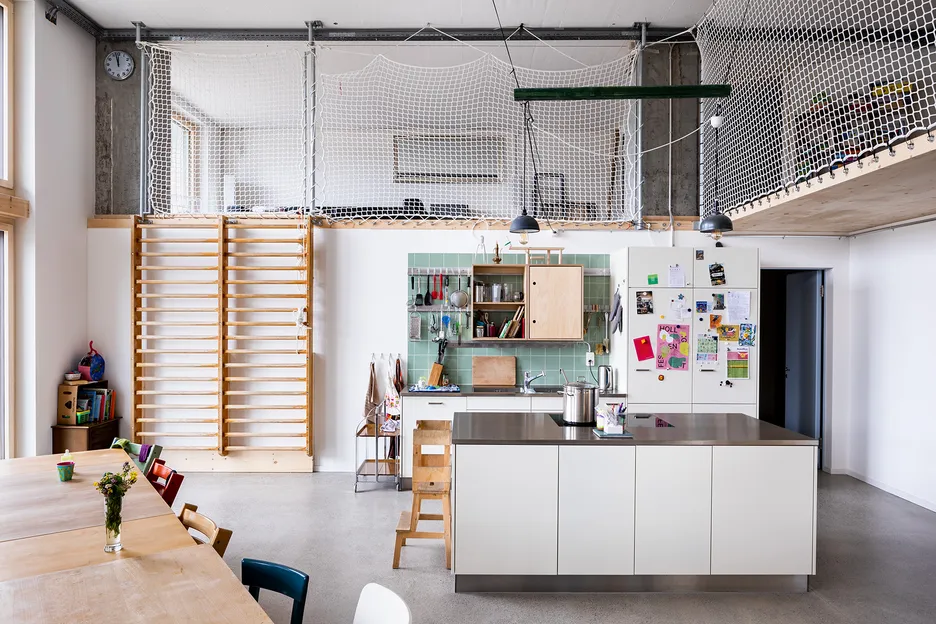Collaborative Use of the Existing Building Stock - Perspectives for Families (BegeFa)
In the face of climate change and urban transformations towards climate adaptation and climate mitigation and the German “Bauwende” (“building and construction reset”) as well as rising construction and housing costs, the conversion of existing buildings to collaborative or mixed-use housing models is crucial, yet there is no research in this area. In our ongoing research “Collaborative Transformation of the Existing Building Stock” (“BegeFa”) we are analyzing the repurposing of various building typologies from different building phases with collaborative housing. Re-use is challenging in terms of urban planning, typology and economics, while at the same time enabling innovative mixed uses (see Reichenbach-Behnisch et al 2017). Collaborative housing in particular shows unusual ways of sharing resources, exploiting opportunities for differentiated housing needs and the combination of housing with commercial, cultural, educational and social activities. At the same time, the digitalization push in the world of work is blurring the spatial and social distinction between living and working. The demands on housing are changing. For families in particular, these developments present both opportunities and challenges.
Against this backdrop, the interdisciplinary project sheds light on the potentials and obstacles for collaborative housing transformations from a spatial and social science perspective. From a spatial perspective, the focus is on questions of adaptability and the use of collaborative housing projects as well as socio-ecological impacts.
Following the BBSR-funded study "FaGeWo" -"Families in collaborative housing forms" '(Dürr et al 2021), the social perspective focuses on families and care -centred networks. Using the example of existing collaborative housing projects, the interweaving of spatial conditions of space with the everyday practices of producing family - "Doing Family" (Jurczyk 2020) - will be examined.
The overall project (24 months) consists of two project parts. The here presented first project (12 months) includes a systematic survey of existing projects. Explorative family and expert interviews as well as a practical workshop generate relevant research dimensions as well as scientific and practical results. The second part will anlyse case studies in a follow-up project.
The interdisciplinary research “BegeFa” combines methods from social and spatial studies and is a cooperation between the Professorship of Urban Design (TUM) and the German youth institute (DJI) funded by the Federal Office for Building and Regional Planning (BBSR), the Stiftung Trias and the Stiftung Öko Sozial (GLS Bank) foundations.
BBSR Zukunftbau Researchfunding more Information
Contact: Dr. Isabel Glogar (PI), isabel.glogar@tum.de
Research Framework: April 2024 – September 2025
Funding: BBSR Zukunft Bau Förschungsförderung
Stiftung Trias
Stiftung Öko-sozial / GLS Treuhand
Cooperationpartner: Deutschen Jugendinstitut (DJI)
Professur für Urban Design, Professur für Urban Design, Prof. Dr. Benedikt Boucsein
Principal Investigator: Dr. Isabel Glogar (PI)
Contact: isabel.glogar(at)tum.de
Team: Dr. Isabel Glogar, Paul Seelinger
Research Partners:
Deutsches Jugendinstitut, Fachgruppe Familienpolitik und Familienförderung
Dr. Martina Heitkötter, Dr. Laura Castiglioni, Dr. Lisa Abbenhardt, Linda Biester
Publications
Glogar, Isabel: Collaborative Housing and Transformations of the Existing Building Stock. ENHR CONFERENCE 2024 Making Housing Systems work: Evidence and Solutions , TU Delft, 2024
Media
- “Zusammenleben gestalten” / Thematic Journal Issue at the Hochparterre magazine, Link to the e-Paper.
